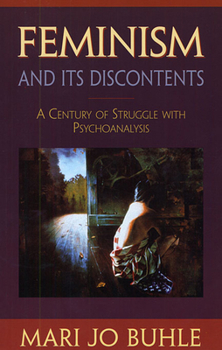Feminism and Its Discontents: A Century of Struggle with Psychoanalysis
Select Format
Select Condition 
Book Overview
With Sigmund Freud notoriously flummoxed about what women want, any encounter between psychoanalysis and feminism would seem to promise a standoff. But in this lively, often surprising history, Mari Jo Buhle reveals that the twentieth century's two great theories of liberation actually had a great deal to tell each other. Starting with Freud's 1909 speech to an audience that included the feminist and radical Emma Goldman, Buhle recounts all the twists and turns this exchange took in the United States up to the recent American vogue of Jacques Lacan. While chronicling the contributions of feminism to the development of psychoanalysis, she also makes an intriguing case for the benefits psychoanalysis brought to feminism.
From the first, American psychoanalysis became the property of freewheeling intellectuals and popularists as well as trained analysts. Thus the cultural terrain that Buhle investigates is populated by literary critics, artists and filmmakers, historians, anthropologists, and sociologists--and the resulting psychoanalysis is not so much a strictly therapeutic theory as an immensely popular form of public discourse. She charts the history of feminism from the first wave in the 1910s to the second in the 1960s and into a variety of recent expressions. Where these paths meet, we see how the ideas of Freud and his followers helped further the real-life goals of a feminism that was a widespread social movement and not just an academic phenomenon. The marriage between psychoanalysis and feminism was not pure bliss, however, and Buhle documents the trying moments; most notably the Momism of the 1940s and 1950s, a remarkable instance of men blaming their own failures of virility on women. An ambitious and highly engaging history of ideas, Feminism and Its Discontents brings together far-flung intellectual tendencies rarely seen in intimate relation to each other--and shows us a new way of seeing both.Format:Paperback
Language:English
ISBN:0674004035
ISBN13:9780674004030
Release Date:November 2000
Publisher:Harvard University Press
Length:452 Pages
Weight:1.30 lbs.
Dimensions:1.1" x 5.7" x 8.9"
Customer Reviews
2 ratings
Five Stars for Content, Three for Analysis
Published by Thriftbooks.com User , 17 years ago
This is an excellent historical overview of feminism as it developed in the United States, specifically in its engagement with the then-new perspectives of Freud's system of understanding. The major feminist figures, their views, and the backdrop of the times in which they acted upon the cultural and political stage, are all well-presented. The original enthusiasm of many feminists for psychoanalysis and for Freud is made clear by the author. That the process of disenchantment took place over a span of decades and closely corresponded to major revisions of Freudian psychoanalysis by the "neo-Freudians," is similarly made plain. The author is to be commended for laying out this history in a very methodical and accessible fashion. Beyond providing information, this book has a major deficit: the author cannot bring herself to baldly state that feminism and feminists have come to be rife with major contradictions, though she usually presents their views well enough. (A noticeable exception is her labeling Camille Paglia an 'antifeminist', with no definition or proof provided to bolster this characterization.) The last sentence in the book is apparently supposed to act as an adequate summary: that whatever else one may say, ideas clearly matter. This is as weak as it is revealing...for if *that* is the product of having laid out a welter of irreconcilable positions and perspectives that are all to be called 'feminist', then one has displayed ideas in such a state that their "mattering" consists of nothing more than sisterly dissonance. Once again--this is a book well worth reading, notwithstanding the author's wish to gloss over the chaotic and jumbled state of contemporary feminist theory. Useful as a history, it does nothing to resolve feminism's apparent intellectual dead end, a cul de sac wherein the author has had to admit that feminists even disagree as to whether there is such a thing as 'woman'.
Perfect
Published by Thriftbooks.com User , 25 years ago
As a male I now appreciate feminism more than ever. Buhle is rich in recording women's movements from 1909 to date. Particularly interesting is how most men grow into jerks--and stay that way--and why women's power is so far reaching into men's lives that it is--that it shows us--everyday.






